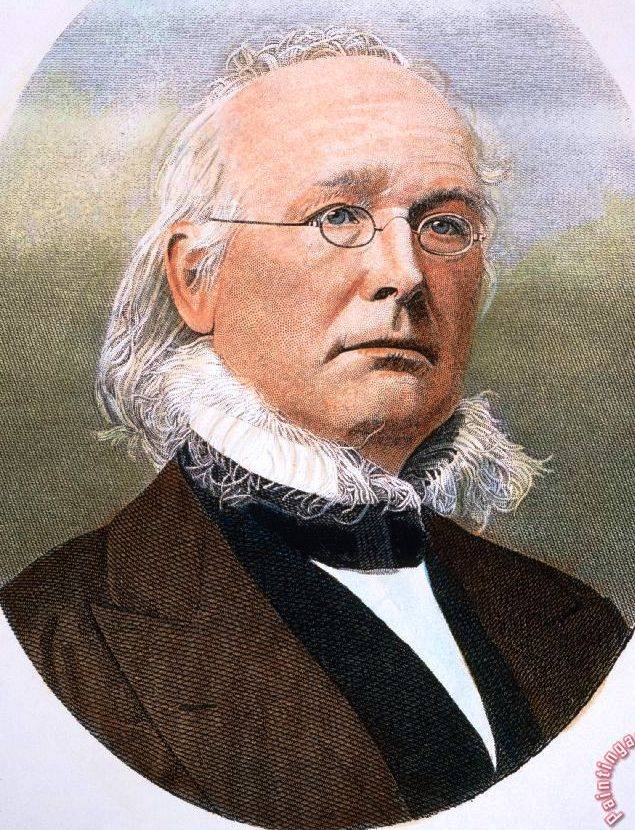Few figures in 19th-century America were as influential-or as contradictory-as Horace Greeley. A printer’s apprentice who rose to become the most famous newspaper editor of his time, Greeley was a relentless advocate for reform, a fierce political player, and a man whose ideals often clashed with the realities of his era. His life was a whirlwind of ink, politics, and unyielding opinion, leaving a legacy that still echoes in journalism and public discourse today.
From Farm Boy to Newspaper Titan
Born in 1811 in Amherst, New Hampshire, Greeley’s early life was marked by poverty and hard labor. His family struggled on their small farm, and young Horace, a bookish and frail child, found escape in reading. At 15, he became a printer’s apprentice, a common path for bright but penniless young men of the time. Printing shops were the universities of the working class, and Greeley absorbed everything-politics, literature, and the mechanics of spreading ideas through type.
By 1831, he landed in New York City, a bustling hub of newspapers and political ferment. After years of scraping by as a freelance writer and printer, he co-founded The New-Yorker (unrelated to the modern magazine), a literary paper that showcased his talent but struggled financially. His big break came in 1841 when he launched The New-York Tribune, the newspaper that would make him a household name.
he Tribune: A Paper with a Purpose
Greeley didn’t just want to report the news-he wanted to change society. At a time when many papers were openly partisan or sensationalist, the Tribune stood out for its moral tone and reformist zeal. Greeley hired some of the best writers of the day, including Margaret Fuller and Karl Marx (who briefly served as a European correspondent), but the paper’s voice was unmistakably his own.
He championed causes that were radical for the time: abolition, women’s rights, labor rights, and opposition to the Mexican-American War. His editorials were fiery, often moralistic, and relentlessly persistent. While some dismissed him as a utopian dreamer, his words carried weight. The Tribune became the most widely circulated paper in the country outside the South, shaping opinion not just in cities but in rural communities where families read it aloud like scripture.
A Political Force-And a Contradiction
Greeley’s influence extended beyond journalism into politics, though his career there was more turbulent. He helped found the Republican Party in the 1850s, pushing it toward anti-slavery positions, and was a staunch supporter of Abraham Lincoln-though their relationship was rocky. Greeley’s famous 1862 editorial, "The Prayer of Twenty Millions," pressured Lincoln to move faster on emancipation, showcasing both his idealism and his impatience with political compromise.
Yet Greeley was full of contradictions. He despised slavery but initially opposed the Civil War, believing the South could be persuaded back into the Union peacefully. Later, he shocked many by signing a bail bond for Jefferson Davis, the Confederate president, arguing that reconciliation required mercy-a move that alienated his Republican allies.
"Go West, Young Man" (And Other Quirks)
Greeley’s most enduring phrase-"Go West, young man, and grow up with the country!"-encapsulated his belief in opportunity and expansion. He saw the West as a safety valve for poverty and a place where hard work could yield prosperity. Ironically, Greeley himself hated traveling and only made one grueling trip west, which he chronicled in his book An Overland Journey from New York to San Francisco.
His personal life was equally paradoxical. A vegetarian and temperance advocate, he was also a workaholic who drove his employees mercilessly. He preached self-reliance but bailed out his ne'er-do-well brother financially for years. His marriage to Mary Cheney was strained, and his only surviving child, Ida, died tragically young-a blow from which he never fully recovered.
The Ill-Fated Presidential Run
In 1872, Greeley made the biggest gamble of his life: running for president as the candidate of the Liberal Republicans and Democrats against incumbent Ulysses S. Grant. It was a disastrous campaign. Greeley had spent decades criticizing everyone-Democrats, Southerners, Radical Republicans-and now he needed their votes. His platform, focused on civil service reform and reconciliation with the South, failed to inspire.
Worse, Grant’s allies painted him as an eccentric, a radical, and a traitor for his Jefferson Davis bail. The campaign exhausted him, and when he lost in a landslide, his health collapsed. Within weeks, he was dead, passing away on November 29, 1872, before the Electoral College even cast its votes.
Legacy: The Editor Who Wouldn’t Be Ignored
Greeley’s death marked the end of an era in journalism. The Tribune remained influential but gradually lost its fiery moral edge. Yet his impact was undeniable. He proved that a newspaper could be both profitable and a force for change, blending reporting with advocacy in a way that later reformers like Joseph Pulitzer would emulate.
His life was a testament to the power-and limits-of idealism in a messy democracy. He pushed America to confront its injustices but often stumbled in the arena of practical politics. Today, his name lingers in history books, on schools, and in the occasional political quote, but his real monument is the tradition of journalism that challenges power, provokes debate, and refuses to stay silent.
Horace Greeley wasn’t just a newspaperman. He was a man who believed the press should do more than inform-it should stir the nation’s conscience. For better or worse, he spent his life doing exactly that.



